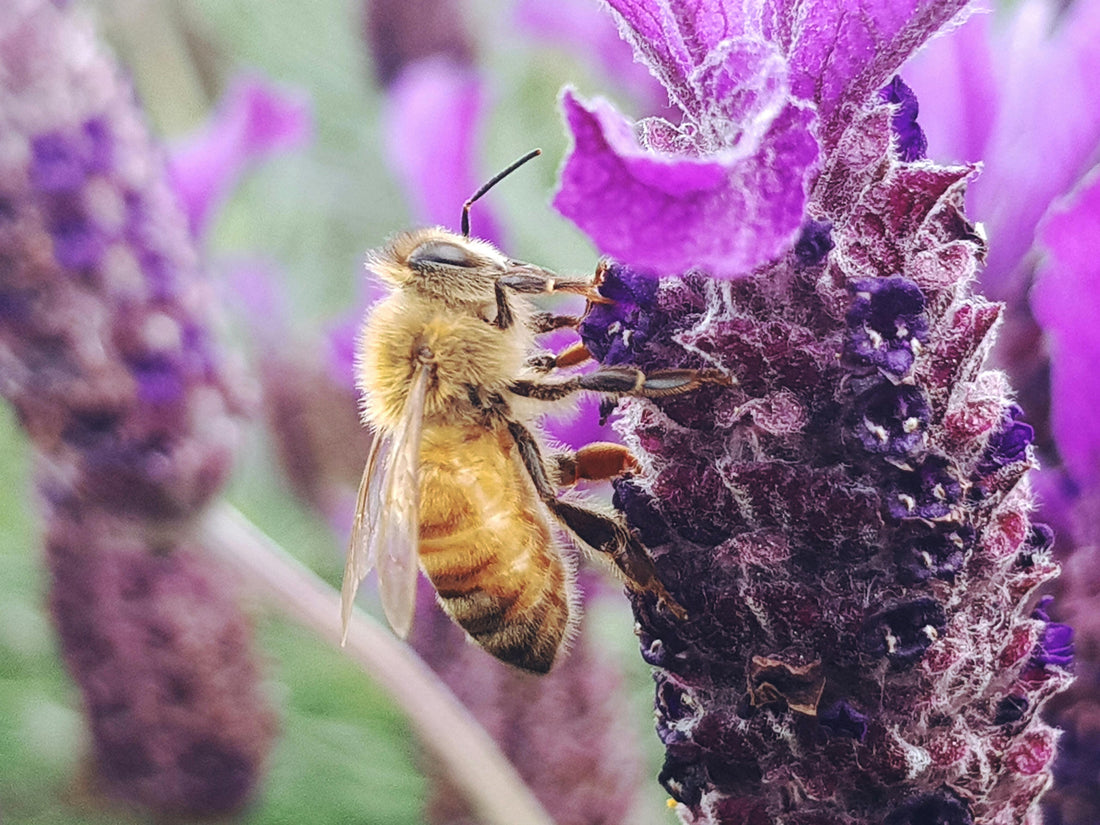At first, it might seem unlikely that humans could learn anything significant from honeybees. These tiny insects don’t share the advanced abilities we often value—they don’t speak, read, or write, and their simple hives are nothing compared to our impressive skyscrapers. We have imagination, self-awareness, complex emotions, and moral reasoning. Still, in spite of these differences, honeybees may be some of the most overlooked sources of wisdom in the natural world. As they quietly move through our gardens and skies, they lead lives defined by purpose, discipline, and cooperation. Though their time on Earth is brief, their impact is profound—and they achieve it all without pride, complaint, or the need for recognition. Maybe it’s time we started noticing what they have to show us.
Here's what these humble insects can teach us about living a life that matters:
1. Do Good, Simply Because It’s Good:
When honeybees pollinate flowers, they aren’t doing it for a reward or recognition. They act instinctively, without knowing that their efforts are essential to the survival of countless plants—and ultimately, their own species. Bees don’t control the greater cycle of life, yet their simple, selfless actions sustain it. Their quiet contributions remind us that doing good, even without immediate benefit, often creates ripples of impact far beyond what we can see.
2. Make Every Moment Count:
A worker bee’s life lasts only five to six weeks, yet in that brief time, it can visit thousands of flowers in a single day. Every moment is purposeful, every day filled with contribution. Though short, its life is far from wasted. Bees show us that it’s not about how long we live, but how intentionally we use the time we have.
3. The Power of Teamwork:
Honeybees are some of nature’s most dedicated team players. Everything they do is rooted in cooperation. While each bee has an individual role, the well-being of the hive always comes first. If one bee falters or falls behind, others instinctively step in to ensure the work continues seamlessly—never letting the collective effort slow down.
As Mark L. Winston notes in Lessons from the Hive, honeybees thrive through decentralized, collective decision-making. Their strength lies in adaptability, self-organization, and shared responsibility. It’s a true “all for one and one for all” system—an inspiring model of unity and collaboration we could all learn from.
4. Support Through Connection:
Honeybees exemplify what it means to support one another. As noted by Jacqueline Freeman in Song of Increase, if a bee experiences discomfort—such as an itch—another bee will instinctively assist, locating and addressing the issue. When a worker bee requires grooming, she performs a specific dance to signal her need, and a nearby bee responds without hesitation.
Beyond physical care, bees also engage in sophisticated communication to benefit the entire colony. Through the well-known “waggle dance,” they convey detailed information about the location and quality of food sources, enabling the hive to operate with remarkable efficiency and coordination.
This behavior reflects a model of precise, empathetic collaboration. Honeybees demonstrate that strong communities are built on attentiveness, clear communication, and mutual responsibility. While human environments—whether at work or in society—can be complex and sometimes inequitable, adopting these principles individually can help foster more cohesive, compassionate systems.
5. Always Give Your All
In the world of honeybees, there is no concept of splitting tasks evenly or competing for credit. If a job needs to be done, any bee capable of doing it steps in without hesitation. This selfless approach creates a level of efficiency and harmony rarely seen in human systems.
In extraordinary situations—such as when the Queen becomes ill or dies—worker bees may even take reproductive action to preserve the genetic continuity of the species. Although worker bees cannot fertilize eggs, they can lay unfertilized ones that develop into male drones through a process called parthenogenesis. While the hive itself may not survive without female workers, these drones can go on to mate with queens from other colonies, supporting the broader health and survival of the bee population.
6. Live Sustainably:
Honeybees are masters of efficiency and resource management. They expand their hive only when necessary—whether to accommodate a growing population or to store additional food. Recognizing that challenges and shortages are inevitable, bees take proactive measures to prepare for hard times like food shortages or potential disasters. This careful, deliberate approach helps them conserve energy and avoid waste, ensuring they focus only on what is essential for their survival and prosperity.
7. Seize the Day:
Bees make the most of every moment of daylight, utilizing each ray of sunshine to its fullest. They even store nectar in the smallest nooks to ensure no time is wasted. Constant learners, bees are quick to adapt. They focus on flowers that consistently provide a reward, paying attention to their color and scent. If the reward becomes scarce, they move on to better opportunities. In essence, bees live in the present, continuously evolving and leaving behind outdated methods that no longer serve them.
8. Lead with Humility and Purpose:
In a honeybee colony, the queen plays a central role—not through dominance or command, but through quiet, purposeful leadership. There is no bureaucracy or micromanagement; she fulfills her essential duties while trusting the hive to perform theirs. Though the colony depends on her, she remains a servant to its needs. This model of leadership reminds us that the most effective leaders empower others, lead by example, and place the well-being of the whole above personal authority.
9. Make Every Interaction Count:
Bees and flowers engage in a fascinating form of communication that goes far beyond what we can see. Researchers at the University of Bristol discovered that bees can detect the natural electric fields of flowers. As bees fly, they build up a positive electrical charge, and when they land on a flower to collect nectar or pollen, that charge alters the flower’s own field for several minutes. This temporary change signals to other bees that the flower has already been visited and needs time to replenish, helping them avoid wasted effort.
As Professor Daniel Robert puts it, “the last thing a flower wants is to attract a bee and then fail to provide nectar.” It’s a lesson in honest communication—because bees are smart, and they quickly learn to avoid flowers that don’t deliver. In nature, even the smallest encounters leave a trace. Likewise, in our own lives, the way we show up—authentically and consistently—can shape how we’re remembered. Every action matters. Every impression lasts.
10. Rest Is Part of the Work:
Despite their reputation for constant activity, honeybees actually spend up to two-thirds of their time resting. While they work with remarkable focus and discipline, they also understand the importance of recovery. Rest isn’t a luxury—it’s essential for sustaining their productivity and well-being.
If your goal is success, then collaboration, efficiency, and clear communication are essential tools. Strong leadership, the ability to seize opportunities, a resilient work ethic, and adaptability are all traits shared by both honeybees and high-performing individuals. So work with purpose, live wisely, act with integrity—and don’t forget to pause and recharge when needed. Even the busiest bees make time for rest.
In conclusion, honeybees offer profound lessons on how to live a meaningful life. Their selfless actions remind us to do good without expecting rewards, while their efficient use of time shows the value of living purposefully. Bees excel in teamwork, support one another, and lead with humility—qualities that strengthen both personal and professional relationships. Their adaptability teaches us to embrace change, and their sustainable practices inspire us to live thoughtfully and prepare for challenges. Ultimately, bees remind us that balance—between effort, rest, collaboration, and leadership—creates harmony in life.
“Next time you see a bee, don’t just run away—pause. Watch. Learn. Their tiny wings carry lessons we’ve only just begun to understand.”

